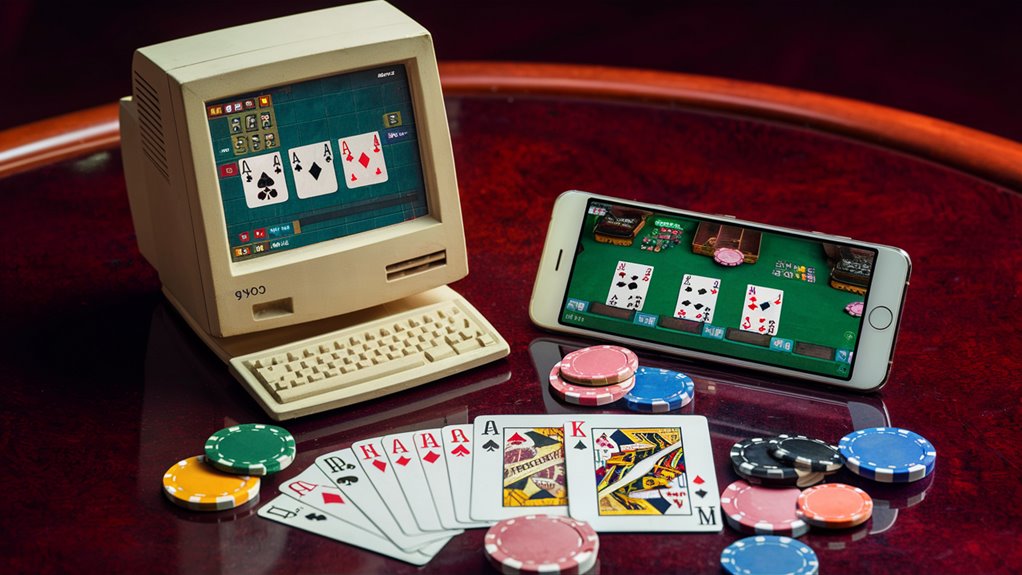The Evolution of Online Gambling: A Historical Timeline

The online gambling boom kicked off in 1994 when Antigua and Barbuda set a landmark by making the Free Trade & Processing Zone Act, which paved the way for online gaming licenses. That year, Microgaming led the charge by crafting the first true online gambling software.
In 1996, a big leap happened when InterCasino rolled out the first real-money online betting site, changing the game for home gambling. The field saw a rapid growth in 1997, shooting up from just 15 websites to more than 200 online gambling sites, starting a new era for broad access to digital betting.
Online poker changed the scene in 1998 with the birth of Planet Poker, triggering a poker craze that would reshape online betting. The march went on into the mobile age, with mobile betting taking over by 2015, making up 70% of all online gambling actions.
More tech leaps have kept transforming the area, with live dealer tech making online casinos feel real. Blockchain tech and cryptocurrency betting showed up as key shifts, and NFT-based games popped up by 2020. Now, the online gambling market is a huge $60 billion field, showing the big impact of tech on digital fun. 상세 자료 비교해보기
Key Tech Breakthroughs
- Safe payment processes
- Random Number Generation (RNG)
- Live stream tech
- Mobile fitting
- Blockchain use
- Cryptocurrency take-up
The ongoing growth of online gambling shows how digital moves change old fields into new, easy-to-get fun spots.
The Birth of Virtual Casinos
The Evolution of Virtual Casinos: A Digital Gaming Revolution
The Big Start: 1994
Antigua and Barbuda made history in 1994 by passing the Free Trade and Processing Zone Act, starting the first rules for online gambling licenses.
This first law fired up a tech wave in gaming, with Microgaming making the first full gambling software that year.
Tech Moves: 1995-1996
The rise of CryptoLogic in 1995 hit a main move in online casino safety, showing top new money move tech for virtual betting.
InterCasino began in 1996, becoming the first working online casino taking real cash bets, with 18 varied casino games from its servers in Antigua.
Sector Growing: 1997-1998
The year 1997 saw a big boom in the online gambling sector, with game sites going from 15 to 200.
The field hit new highs in 1998, making over $830 million.
The start of Planet Poker shifted virtual gaming, showing the first online poker room and setting key rules for digital table games.
Virtual Gaming Changes
The fast change of virtual casinos showed the big chances to mirror real casino fun in the digital world.
The mix of safe pay ways, many game options, and solid platforms made a strong base for today’s online gambling field.
Main Points:
- 1994: First legal rules and gambling software
- 1995: Safe deal tech
- 1996: First real-money online casino start
- 1997: Big market rise
- 1998: Start of online poker spots
Early Rule Issues
Early Rule Issues in Online Gambling

The Rise of Virtual Gaming Rules
The big rise of online gambling in the mid-1990s made a new rule void, as old gaming laws did not fit virtual gambling sites working across borders.
Antigua led the way, starting the first legal rules with its Free Trade & Processing Act of 1994, making a key example for digital gambling rules.
Big Rule Blocks
Rule Mix-Ups
The main test was figuring out where gambling rules applied – was it where the player was, or where the server was? This mix-up made big hard spots for both operators and rule makers.
Money Move Blocks
Pay ways hit big blocks as banks dealt with the law of handling online gambling cash. Banks needed clear rule guides to manage this new digital cash flow while fitting with old money rules.
Safe and Check Issues
Age checks and fraud stops stood out as key needs in the virtual setting. The lack of in-person meets pushed for new ways to check player IDs and keep deals safe.
The Impact of Kahnawake Gaming Commission
The start of the Kahnawake Gaming Commission in 1996 was a key time in online gambling rules. This leading rule body showed how lands could well handle digital gaming while keeping tight license rules.
The Commission’s way became a model for others, changing online gambling watch and setting key rule examples.
Rise of Poker Rooms
The Rise of Online Poker Rooms: A Digital Gaming Revolution
The Early Time of Online Poker
Digital poker rooms showed up as key spots in the late 1990s, marking a big shift in virtual betting history.
Planet Poker made history in January 1998 by starting the first real-money online poker room, offering $3-$6 limit Hold’em games.
Paradise Poker came into the game in 1999, setting new highs with better software steadiness and more game types. The Most Unexpected Places Where Gambling Is Legal
Field Change and Market Growth
Party Poker changed the online poker scene in 2001 with smart ads and a user-focused way.
Their key move with World Poker Tour in 2002 lifted online poker’s real face, pulling in loads of new players.
PokerStars began that year, and later became the top name after the 2006 UIGEA law.
The Golden Time of Online Poker
The years from 2003-2006 mark the clear golden time of online poker, pushed by Chris Moneymaker’s WSOP win through a PokerStars qualifier.
Field cash jumped from $365 million to $2.4 billion a year. Top spots brought in big new features like:
- Many-table games
- Sit-and-go styles
- Hole-card cameras
These moves truly changed the online poker feel, making the ground for today’s digital poker fun.
